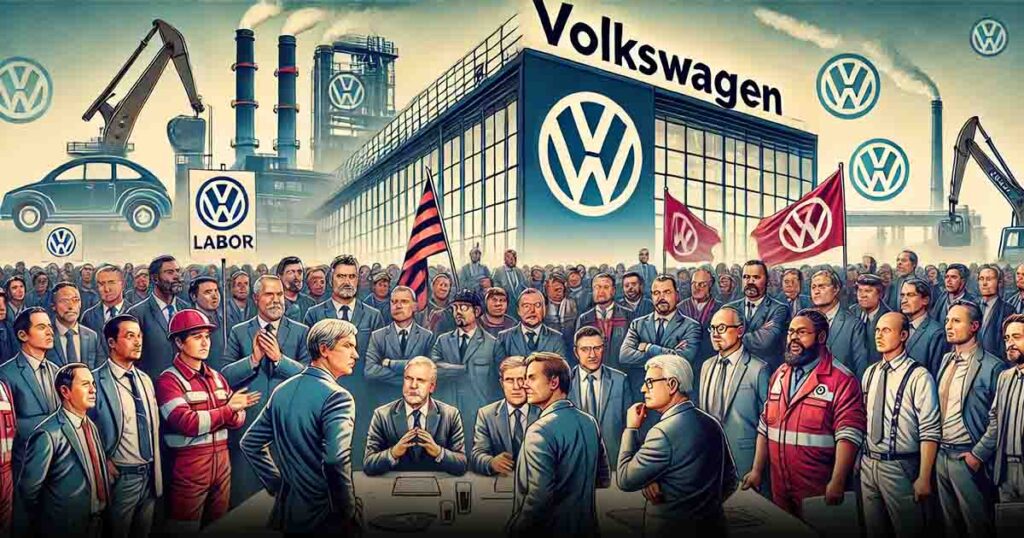As Volkswagen navigates a challenging period of escalating operational costs and intense labor negotiations in Germany, its workforce is demanding a 7% pay rise, citing inflation and growing financial pressures. This latest round of wage disputes is gaining significant attention as tensions between labor unions and the automaker heat up. Workers, facing increased living expenses, argue that their compensation must reflect the soaring costs of everyday goods and services, while the company seeks to balance profitability with its employees’ demands.

This article delves into the ongoing labor disputes at Volkswagen, the factors driving workers’ demands, the implications for the company’s future, and what this standoff means for Germany’s automotive industry as a whole.
The Drivers Behind the 7% Pay Demand
Volkswagen workers, represented by powerful labor unions, have made it clear that they are seeking a substantial wage increase due to a combination of external and internal factors. Some of the primary reasons behind the demand include:
1. Rising Inflation and Cost of Living
- Inflation in Germany has surged to its highest level in decades, putting pressure on workers who are struggling with the rising costs of food, energy, housing, and other essential goods.
- Despite Volkswagen’s profitability, workers feel their salaries have not kept pace with inflation, eroding their purchasing power and standard of living.
2. Increased Workload and Operational Demands
- In recent years, the automotive industry has been under intense pressure due to global supply chain disruptions, transitioning to electric vehicles (EVs), and maintaining production standards. Workers argue that this has led to an increased workload without a proportional increase in pay.
- As the company shifts towards electrification, there is a growing sense of uncertainty about job security and the future of certain manufacturing processes, amplifying concerns among employees.
3. Strong Union Advocacy
- Unions in Germany, particularly IG Metall, one of the most influential labor unions in Europe, are playing a pivotal role in representing workers’ interests. The union has been outspoken about ensuring fair wages for workers, especially as many companies, including Volkswagen, report strong financial results despite broader economic challenges.
Volkswagen’s Response: Balancing Profits with Labor Costs
Volkswagen, as one of the world’s largest automakers, has had to balance these wage demands with the operational realities of running a global business. Some of the key points from the company’s perspective include:
1. High Operational Costs
- Volkswagen, like many other companies, is facing rising costs in raw materials, energy, and logistics. The switch to electric vehicles, while a long-term strategic necessity, also involves significant investments in research, development, and infrastructure.
- The automaker is attempting to keep its profit margins intact while ensuring that it continues to invest in future-proof technologies.
2. Record Profits Amid Economic Turmoil
- Volkswagen’s financials have shown impressive profits, despite the broader challenges facing the global automotive market. The company has been quick to point out that its strong financial position is the result of its robust product lineup, especially in the EV segment. However, it must also account for the heavy investment required for restructuring its manufacturing lines and developing new technologies.
3. Negotiations in a Global Context
- Volkswagen is aware of the ongoing labor disputes in other industries across Europe. If the company settles for a significant pay raise, it could set a precedent for other sectors, increasing labor costs across Germany’s industrial base.
- This dynamic creates a tense negotiating environment, as the company tries to balance employees’ demands with its shareholders’ expectations.
Implications of the Dispute: What’s at Stake for Volkswagen?
1. The Risk of Strikes and Work Stoppages
- Labor unions have warned that if their demands are not met, they could resort to strikes, which would disrupt Volkswagen’s production lines and impact vehicle deliveries. Given the competitive nature of the automotive industry, any disruption could have severe consequences on the company’s bottom line and market share.
- A prolonged strike would not only affect Volkswagen’s profitability but could also harm the company’s reputation, particularly in a market where automotive manufacturers are vying to secure positions in the EV sector.
2. Impact on Employee Morale and Company Culture
- The ongoing wage dispute is also a reflection of deeper issues related to employee satisfaction and company culture. Volkswagen, which has historically been known for its strong relationship with labor unions, faces the challenge of maintaining a positive work environment amidst growing tensions.
- If the dispute is not resolved fairly, it could damage the trust between workers and management, affecting long-term productivity and morale.
3. Environmental and Technological Shifts
- With the automotive industry transitioning to electric vehicles, Volkswagen is making significant investments in the future. However, workers argue that this shift should also bring about equitable compensation, as they are integral to this transition.
- If the company is seen as not sharing its financial successes with the workforce, it could undermine employee support for these strategic shifts, particularly in areas such as EV manufacturing and digitalization.
What’s Next: The Road Ahead for Volkswagen and Its Workers
The outcome of these wage negotiations will have far-reaching consequences for both Volkswagen and the broader German automotive industry. Several key areas to watch include:
1. Potential Settlement or Concessions
- Volkswagen could choose to offer a compromise, such as a smaller pay rise or other benefits, to avoid the threat of strikes and work stoppages. Some analysts believe a settlement is likely, as both parties have a vested interest in avoiding a protracted dispute.
- Non-monetary benefits, such as improvements in working conditions or job security in the context of the EV transition, could also be on the table as part of the negotiations.
2. Increased Pressure on the German Economy
- A resolution to the dispute will have implications for Germany’s broader economy. The country’s automotive industry, which is one of the largest employers in Europe, is facing a period of transformation. How Volkswagen handles this wage dispute may set a precedent for negotiations in other key sectors.
3. Industry-Wide Implications
- If Volkswagen agrees to a significant wage increase, it may spark similar demands from workers in other industries, especially in sectors that have also benefited from high profits in recent years. This could lead to a broader shift in wage negotiations across the German economy, with potential ripple effects across Europe.
Conclusion: A Critical Moment for Volkswagen and Germany’s Workforce
The ongoing wage dispute at Volkswagen highlights the growing tensions between labor and management in the context of a rapidly changing global economy. With rising inflation, an uncertain future for many workers in the automotive industry, and strong union representation, the stakes are high for both sides. As the automaker prepares for a future centered around electric vehicles, how it navigates these labor negotiations will be a crucial test of its ability to maintain a balance between corporate profitability and fair compensation for its workforce.
For Volkswagen, finding a resolution to this dispute is not just about addressing workers’ demands—it’s about ensuring the company’s long-term success in a rapidly evolving automotive landscape, while keeping its employees on board for the challenges ahead.






